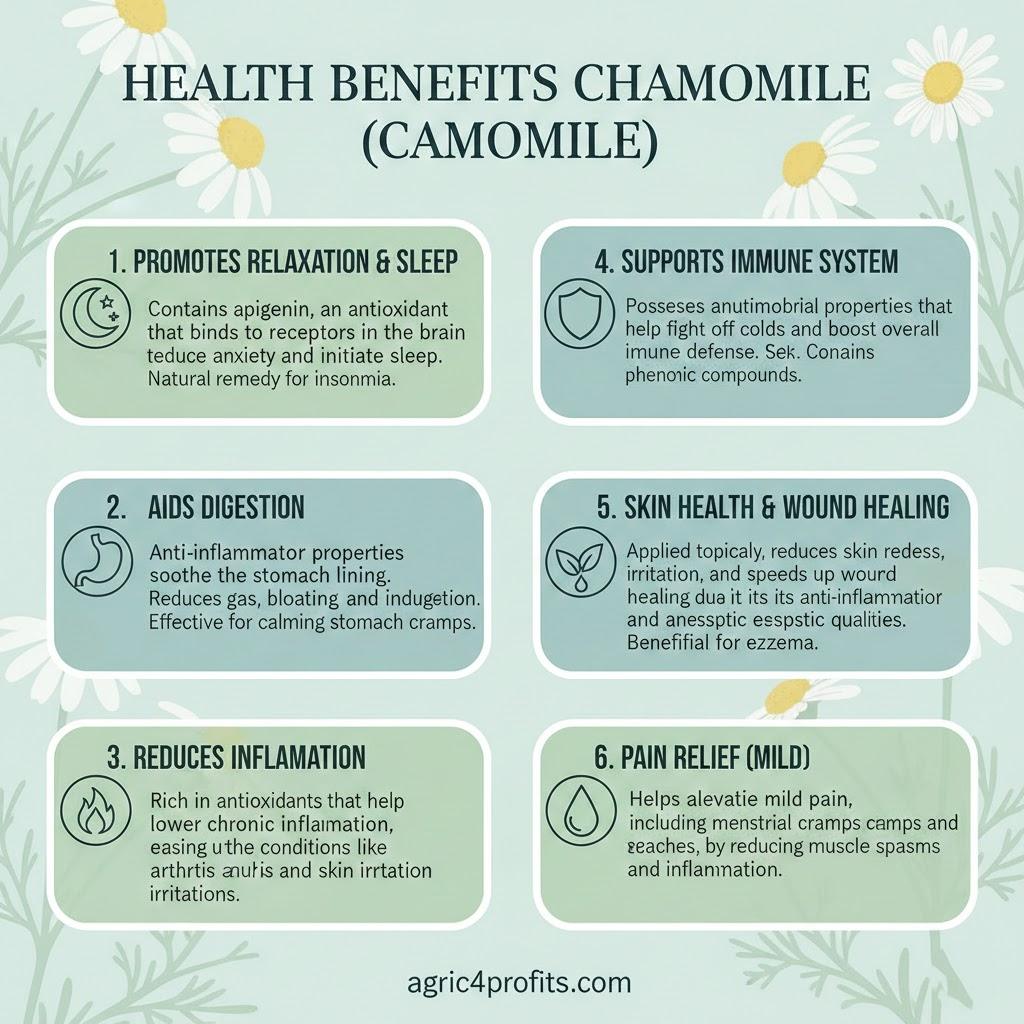Chamomile formally written as camomile (Asteraceae). English, Roman, or German chamomile (Chamaemelum Nobile) or German chamomile is used to make chamomile tea, which is a tonic, an antibacterial, and an ingredient in many herbal treatments (Matricaria chamomilla). Several kinds, particularly golden marguerite, or yellow chamomile, are grown as ornamentals in gardens (Cota Tinctoria).
They have yellow or white disk flowers and yellow ray flowers in small flower heads as a distinguishing feature. Mayweed, often known as stinking chamomile (A. Cotula), is a pungent weed that has been employed as an insecticide and a drug.
The high concentration of disease-fighting antioxidants like terpenoids and flavonoids in dried chamomile flowers, one of the oldest and most adaptable therapeutic herbs known to mankind, has multiple, wide-ranging health consequences.
The primary components of chamomile’s natural healing qualities are its essential antioxidants, which are present in the plant’s powerful oils.
Since nearly 5,000 years ago, chamomile has been used in standardized tea, herbal extracts, and cosmetic products to promote tranquility, vitality, a youthful appearance, and longevity. It is an efficient alternative medicine with almost no known adverse side effects.
When consumed in quantities found in food, chamomile is seen as “likely safe” and when applied to the skin for brief periods of time, it is regarded as “maybe safe”.
If you’re going to utilize chamomile essential oil, keep in mind that it should only be applied topically to the skin, not consumed. Before using the plant’s oils for other purposes, conduct a patch test on a tiny area of your skin to ensure that you do not react negatively to them.
Read Also: 10 Health Benefits of Curry Leaves (Murraya koenigii)
7 Health Benefits of Chamomile (Matricaria chamomilla)

1. High Source Of Antioxidant
The terpenoid family of antioxidants, which includes chamazulene and acetylene derivatives, makes up the majority of the antioxidant substances isolated from chamomile flowers. These fragile components are unstable, thus it is believed that an alcoholic tincture or “essential oil” form is the best way to preserve them.
Numerous phenolic substances, particularly flavonoids including apigenin, quercetin, and athletic as well as other glucosides, are also important components of the flowers.
By combating free radical damage and inhibiting cell mutation, these substances contribute to the reduction of inflammation. Antioxidants found in chamomile have been linked to improved immunological function, a decreased risk of mood disorders, a reduction in pain and swelling, and healthier skin, hair, nails, teeth, and eyes.
2. Improves Digestive System
Chamomile is thought to be a potent digestive relaxant that can be used to treat a variety of gastrointestinal disorders, including nausea, vomiting, motion sickness, nausea and symptoms of gas and acid reflux, indigestion, diarrhea, and anorexia.
Children who have diarrhea or colic may have their symptoms, such as pain and anxiety, reduced with the use of chamomile extract. Additionally, anodyne chemicals included in chamomile oil are anti-spasmodic and reduce cramping, constipation, and other stomach aches.
The soothing properties of chamomile are responsible for many of these advantages. A calmer state of mind can also aid in the healing of the leaky gut, which may result in fewer symptoms of chronic conditions like leaky gut, IBS, and other gut-related problems. This is because the brain and the gut communicate directly back and forth via the vagus nerve.
Chamomile has mellowing qualities that make it a suitable choice for pregnant women since they help to soothe the digestive system and treat nausea naturally.
3. Anti-inflammatory and Pain Relief
Since chamomile has long been a well-liked natural pain reliever, it is sometimes referred to as a “herbal aspirin.” To lessen discomfort, congestion, swelling, and redness, chamomile flowers are either used alone or in conjunction with other anti-inflammatory meals.
They work effectively at easing facial edema, rashes on the skin, toothaches, discomfort from infections, and underlying inflammation. Because of this, chamomile extract is frequently included in cosmetics like bath soaps, toothpaste, and body lotions.
A chamomile gel can lessen migraine pain, according to a 2018 crossover study that was published in the journal Neurological Science. The pain brought on by arthritis, injuries, backaches, fevers, and pregnancy can all be naturally reduced by chamomile.
4. Fights Cancer
Research has recently examined the anti-cancer properties of chamomile. There is evidence that chamomile has beneficial effects, including functioning as a natural cancer treatment and slowing the growth of dangerous tumors.
The antioxidants in chamomile termed apigenin, which are bioactive components that appear to aid in the fight against skin, prostate, breast, and ovarian cancers, are thought to be responsible for the inhibition of malignant cells.
In a recent study, chamomile extracts were found to have very minor growth-inhibitory effects on healthy, normal cells, but they significantly reduced the number of human cancer cells, particularly androgen-refractory cells, which are frequently the origin of prostate cancer.
5. Reliefs Congestion
Many nasal sprays contain chamomile because it has anti-infection and anti-mucus congestion properties. When you’re unwell and trying to get over a cold, the flu, or a sinus infection, chamomile tea is also a wonderful option.
According to studies, inhaling steam infused with chamomile extract can relieve the symptoms of a common cold. To treat mouth, throat, and mucous membrane discomfort, some people even gargle with chamomile tea or extract.
6. Healthy Teeth and Gum
Chamomile benefits include the capacity to combat numerous bacterial infections of the mouth, teeth, and gums in addition to treating the skin and respiratory system. The benefits of chamomile include pain relief for toothaches, wounds, and cancer sores as well as protection against dangerous germs that can exist in the mouth.
According to pilot research discovered in the Journal of Oral Science, gingivitis patients’ biofilm buildup and bleeding were significantly decreased by a mouthwash with 1% chamomile extract. The herb’s antibacterial and anti-inflammatory properties were probably to blame for this.
7. Improves Heart Health
Chamomile has recently been linked to protecting the cardiovascular system. Chamomile consumption in food is associated with a decreased risk of coronary heart disease death in elderly men due to its high flavonoid content.
One study examined the flavonoid intake of 805 men between the ages of 65 and 84 and found that it was significantly inversely related to coronary heart disease mortality. The study was published in The Lancet.
Read Also: 11 Health Benefits of Coriander (Coriandrum sativum L.)
Nutritional value of Chamomile

1. Antioxidants: Chamomile is rich in powerful antioxidants like flavonoids (such as apigenin and luteolin) and phenolic compounds, which help combat oxidative stress and protect cells from damage caused by free radicals.
2. Trace Minerals (Calcium): It contains small amounts of calcium, supporting bone health, muscle function, and nerve signaling even in modest quantities from regular consumption.
3. Trace Minerals (Magnesium): Chamomile provides magnesium, which aids in muscle relaxation, energy production, and maintaining heart rhythm.
4. Trace Minerals (Potassium): This herb offers potassium, essential for regulating blood pressure, fluid balance, and proper heart and muscle function.
5. Trace Minerals (Iron): It includes iron, which contributes to red blood cell formation and oxygen transport in the body.
6. Trace Minerals (Zinc): Chamomile has zinc, supporting immune function, wound healing, and DNA synthesis.
7. Trace Minerals (Copper): Small levels of copper are present, helping with iron absorption, energy production, and connective tissue formation.
8. Vitamin A (from beta-carotene): It supplies vitamin A precursors like beta-carotene, promoting eye health, immune support, and skin integrity.
9. Vitamin C: Chamomile contains vitamin C, an antioxidant that boosts collagen production, immune defense, and iron absorption.
10. Low-Calorie Carbohydrates and Fiber: Dried chamomile provides minimal carbohydrates and some fiber, contributing to low-calorie intake while supporting gentle digestive health without significant energy addition.
These nutritional elements are typically found in dried chamomile flowers or brewed tea, though amounts are trace in infusions and more concentrated in extracts or supplements.
Scientific Evidence and Case Studies on Chamomile

1. Anxiety and Sleep Improvement: A clinical trial showed chamomile extract significantly improved sleep quality in elderly participants over 28 days (Zick et al., 2011, often cited in reviews). Another study found chamomile reduced generalized anxiety disorder symptoms, with apigenin contributing to calming effects (Amsterdam et al., 2009).
2. Anti-Inflammatory Effects: Chamomile inhibits inducible nitric oxide synthase and NF-κB pathways, reducing inflammation in activated macrophages (Srivastava et al., 2010). Animal models confirm potent anti-inflammatory action from compounds like bisabolol.
3. Glycemic Control in Diabetes: In patients with type 2 diabetes, chamomile tea consumption significantly lowered HbA1c, insulin levels, and lipid profiles over 8 weeks (Rafraf et al., 2015).
4. Antioxidant and Antimicrobial Activity: Chamomile demonstrates moderate antioxidant effects and antimicrobial properties in vitro, linked to terpenoids like alpha-bisabolol and chamazulene (McKay & Blumberg, 2006).
5. Digestive Health Support: Studies indicate chamomile aids in managing IBS symptoms and gastrointestinal inflammation, with anti-spasmodic and soothing effects observed in clinical settings.
6. Wound Healing and Skin Benefits: Topical chamomile promotes wound healing and reduces skin irritation, supported by anti-inflammatory and antimicrobial actions in various models.
7. Potential Anti-Cancer Properties: Preliminary in vitro and animal studies show chamomile compounds like apigenin inhibit cancer cell growth in breast, prostate, and other lines, though human evidence remains limited.
These findings come from credible sources like PubMed-indexed reviews and trials, highlighting chamomile’s evidence-based benefits primarily from its bioactive compounds.
Summary of Chamomile
| Aspect | Key Details |
|---|---|
| Plant Overview | Matricaria chamomilla (German chamomile), an annual herb with daisy-like flowers, feathery leaves, and apple-like fragrance; native to Europe/Asia, widely cultivated. |
| Chemical Composition | Essential oils (chamazulene, bisabolol), flavonoids (apigenin, luteolin), terpenoids, coumarins, phenolics, polysaccharides, trace minerals (calcium, magnesium, potassium). |
| Health Benefits | Digestive soothing (indigestion, bloating), anti-inflammatory (arthritis, pain), sleep aid (relaxation), skin health (eczema, wounds), respiratory relief, menstrual pain reduction, anxiety/stress relief, immune support, antioxidant effects, potential anti-cancer and diabetes management. |
| Uses | Tea (most common), topical creams/ointments, essential oil (aromatherapy), capsules, tinctures, steam inhalation, hair/oral rinses, baths. |
| Safety and Side Effects | Generally safe; possible allergies (especially Asteraceae family), drowsiness, GI upset in excess; consult doctor for pregnancy, medications, or conditions. |
| Scientific Backing | Supported by studies on anti-inflammatory, sedative, digestive, and antioxidant effects; more human trials needed for some claims. |
Frequently Asked Questions About Chamomile
1. What is chamomile best known for?
Chamomile is best known as a calming herbal tea that promotes relaxation, better sleep, and stress reduction due to compounds like apigenin.
2. Is chamomile tea safe to drink every day?
Yes, in moderate amounts (1-3 cups daily), it’s generally safe for most people and may offer ongoing benefits like improved digestion and reduced anxiety.
3. Can chamomile help with sleep problems?
Yes, it acts as a mild sedative, helping many people fall asleep faster and improve sleep quality, especially when consumed before bed.
4. Does chamomile have any side effects?
It can cause allergic reactions in people sensitive to ragweed or related plants, mild drowsiness, or stomach upset if overconsumed.
5. Is chamomile safe during pregnancy?
Use in moderation and consult a healthcare provider, as high amounts may pose risks, though small amounts in tea are often considered okay.
6. Can chamomile interact with medications?
It may interact with blood thinners, sedatives, diabetes drugs, or others; check with a doctor if you’re on any prescriptions.
7. What’s the difference between German and Roman chamomile?
German chamomile (Matricaria chamomilla) is the most common for tea and medicinal use, while Roman chamomile (Chamaemelum nobile) is perennial and often used in aromatherapy or as ground cover.
8. How do I make chamomile tea?
Steep 1-2 teaspoons of dried flowers (or a tea bag) in hot water for 5-10 minutes; strain and drink plain or with honey/lemon.
9. Can chamomile help with digestive issues?
Yes, it soothes indigestion, bloating, gas, and IBS symptoms through its anti-spasmodic and anti-inflammatory properties.
10. Is chamomile good for skin?
Yes, topical use (like in creams or compresses) helps soothe irritations, eczema, wounds, and inflammation due to its antimicrobial and calming effects.
Do you have any questions, suggestions, or contributions? If so, please feel free to use the comment box below to share your thoughts. We also encourage you to kindly share this information with others who might benefit from it. Since we can’t reach everyone at once, we truly appreciate your help in spreading the word. Thank you very much for your support and for sharing!
Disclaimer: This article is for educational and informational purposes only. The health benefits described are based on scientific research and traditional knowledge. They ayre not a substitute for professional medical advice, diagnosis, or treatment. Always consult a healthcare professional before using any herb or natural remedy for medical purposes.
Read Also: Banana Tree Care: What You Need to Know

